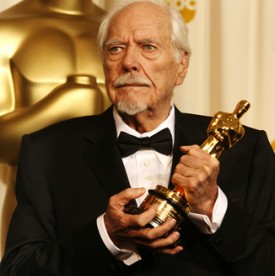A Retrospect on Robert Altman

On November 2006, the world of cinema lost a giant. Director Robert Altman (1925 – 2006) was a maverick in Hollywood, a daring artist whose films captured the messiness and wonderment of human nature. Like John Sayles, a hero to independent film, Altman’s portrayals of community were personable, vast, and generous. Altman could juggle multiple story lines populated with dozens of characters and still make each one distinct and memorable.
Altman was popular in the 1970s, churning out great movies like M*A*S*H* (1970 – Altman hated the toothless TV show), McCabe and Mrs. Miller (1971), Nashville (1975) and Three Women (1977). After the success of Jaws (1975) and Star Wars (1977), the powers in Hollywood deemed that audiences — desire for worldly-conscious character studies had staled after being dazzled by pyrotechnical melodramas. Respectively, those blockbusters were just as compelling in their function in terms of character development than what we mostly get today. Suddenly studio heads wanted to make The Most Profitable Blockbuster™ instead of The Great American Movie. The revered Golden Age of Cinema came to a close. Enter the 1980s, the “Greed Is Good” decade, and Altman the Artist became an outcast in an industry that once embraced him for nearly a decade. Altman described his situation as being a shoemaker in a company that wanted him to make gloves.
For Altman, the quality of his work never wavered, but the studios lost interest so he had to find funding through other channels. After working throughout the 80s on fledgling budgets (Secret Honor, 1984) in TV (Tanner ’88, 1988), and with foreign distribution (Vincent and Theo, 1990); Altman came back with a vengeance. In 1992, Altman took the helm of an all-star studio picture that savagely satirized the bottom line mentality of the Hollywood industry in the brilliant black comedy called The Player. If I was pressed up against a wall and interrogated over which Altman film is my overall favorite, Nashville would be intellectual one but The Player is the one I’d choose with my heart. The Player in question was a Hollywood executive, played by Tim Robbins (Mystic River, 2003), trying to weasel his way out of killing a screenwriter (Vincent D’Onofrio, Household Saints, 1994). It was my favourite movie in 1992.
Altman continued his streak of character-canvas films for fifteen years. The quality of these films ranged from the superb, which included Short Cuts (1993), Gosford Park (2001), The Company (2003, underrated), and A Prairie Home Companion (2006), to the moderate (Dr T and the Women, 2000). Paul Thomas Anderson (There Will Be Blood, 2007) has modeled a great deal of filmmaking sensibilities to Altman. Soon after, Altman took the young talent under his wing. They were such good friends that Anderson co-directed A Prairie Home Companion with Altman whose health was declining. In the film, SNL alumni and actress Maya Rudolph (Idiocracy, 2006) was pregnant with Anderson’s child at the time.
Robert Altman never made a movie just for money; he was the kind of man who relished captured surprises through collaboration and inexplicability. He was honored with the Life Time Achievement Award in 2007 by the Academy Awards. He was nominated seven times as Best Director. Actors in Hollywood loved him because Altman gave them the freedom to perform their greatest range. That night, Meryl Streep and Lily Tomlin paid tribute to Altman’s penchant for overlapping dialogue.
 Altman once mused over his commentary track for Three Women that if he was in a desert island with the means of watching only his movies in an isolated movie house then he wouldn’t watch any. He’s made them and doesn’t need them again. However, had anyone ever stumbled upon his lost matinee, he would greatly enjoy showing his films to the curious spectator. Altman spent much of his life leaving us behind gems to treasure. For an artist who was fascinated with the spontaneous, he still had a plan.
Altman once mused over his commentary track for Three Women that if he was in a desert island with the means of watching only his movies in an isolated movie house then he wouldn’t watch any. He’s made them and doesn’t need them again. However, had anyone ever stumbled upon his lost matinee, he would greatly enjoy showing his films to the curious spectator. Altman spent much of his life leaving us behind gems to treasure. For an artist who was fascinated with the spontaneous, he still had a plan.
“M*A*S*H” (1970) Trailer
“The Long Goodbye” (1973) Trailer
“Nashville” (1975) Trailer
“Gosford Park” (2001) Trailer
“The Company” (2003) Trailer
“A Prairie Home Companion” (2006) Trailer
© 2008 – 2024, CINELATION | Movie Reviews by Chris Beaubien. All rights reserved.
















